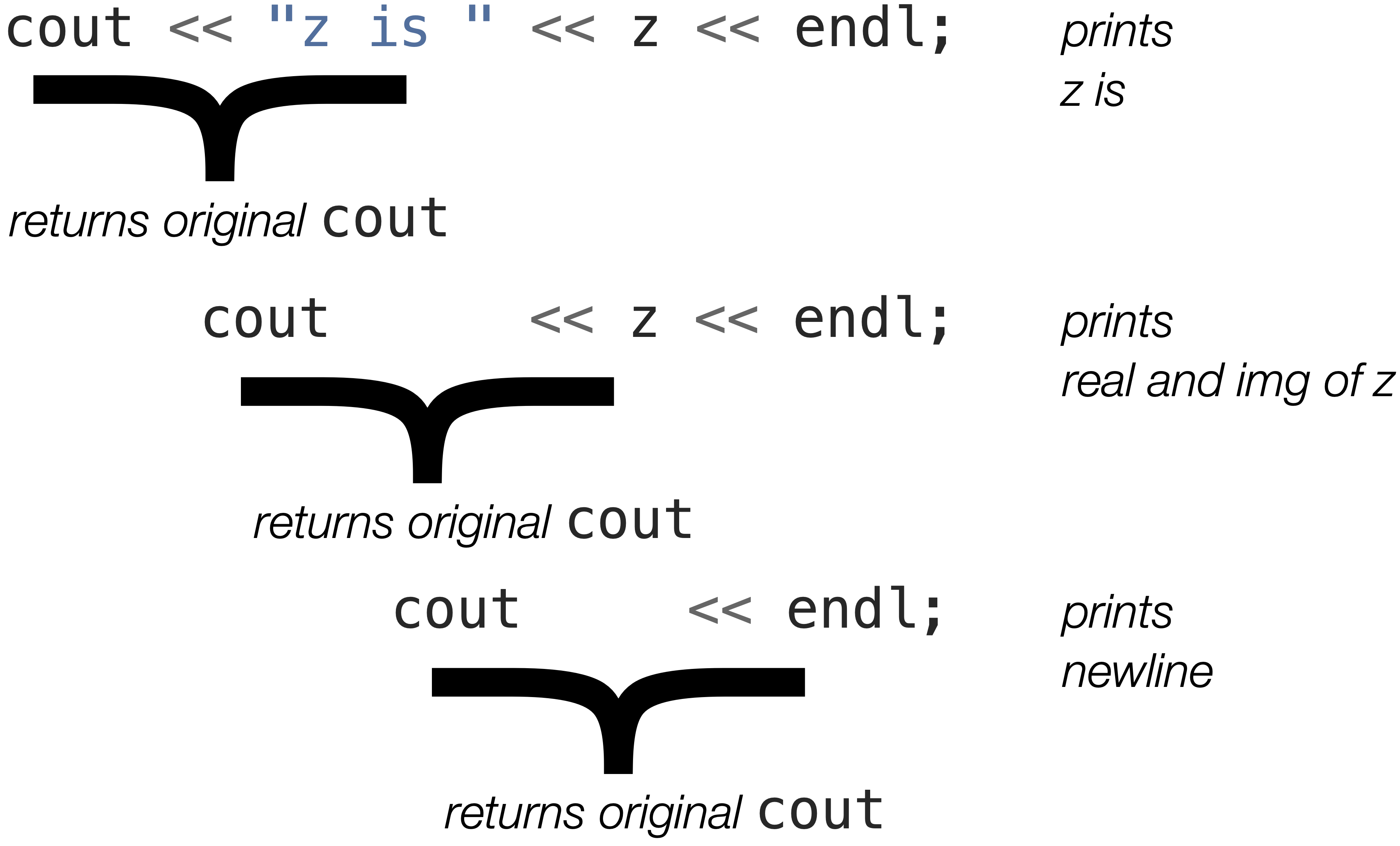Friend Functions
5.2. Friend Functions#
Operator overloading can be implemented using member functions, for example, the + operator when the left operand is an object of the class. However, when the left operand is not an object of the class, we cannot use member functions to overload the operator.
For example, consider the following code that overloads the << operator to print out Complex objects:
Complex z(3, 4);
cout << z; // calls what function?
Issue 1: Cannot have operator<< as member of ostream: In the expression cout << z, the left operand is an object of the ostream class. We cannot interpret this expression as cout.operator<<(z) because we cannot change the ostream class to have a member function that takes a Complex object as an argument. This is because ostream is part of the C++ standard library, and we cannot modify it.
Issue 2: Cannot have operator<< as a member of Complex: Since the left-hand side is not Complex object, we cannot use a member function of the Complex class to overload the << operator.
Solution: Have operator<< as a non-member function that takes an ostream object and a Complex object as parameters. This way, we can overload the << operator to work with ostream and Complex objects.
Another problem! Private members of Complex need to be accessed: operator<< needs to access the private members of the Complex class to print out the real and imaginary parts. How can we allow a non-member function to access the private members of a class?
The final solution is to define operator<< as a friend function of the Complex class. A friend function is a non-member function that (i) has access to the private members of the class in which it is declared as a friend. Also, (ii) it allows the left operand to be of a different type.
For example, we can declare operator<< as a friend function of the Complex class using the friend keyword before the function prototype as follows:
class Complex {
// ...
friend <<return type>> operator<<(<<parameter list>>);
};
Step 1: Understand the function prototype
Input parameter list. The function operator<< should receive cout and z from cout << z as parameters. The left-hand side cout is an object of the ostream class and is received as the first parameter. Then, the right-hand side z is an object of the Complex class and is received as the second parameter.
All streams are passed by reference to avoid making a copy of the stream object. It gives a compile error if we pass the stream by value. Hence, the parameter list should be ostream& os, Complex rhs.
So far, we have the following function prototype in Complex class:
friend <<return type>> operator<<(ostream& os, Complex rhs);
Return type. In C++, we can chain multiple << operators together, for example:

Fig. 5.6 :alt: Chaining operators
:width: 400px
:align: center
:figclass: align-center
Chaining << operators#
The expression cout << "z is " returns an ostream object, which is then used as the left operand for the next << operator. To allow this chaining, the return type of operator<< should be ostream&, which is a reference to the same stream object passed as the first parameter.
Putting it all together, we have the following function prototype in the Complex class:
friend ostream& operator<<(ostream& os, const Complex& rhs);
Here, z is passed as a const reference because we do not want to modify the Complex object when printing it. We are not making the function const because it is not a member function. There is no data members real and img to prevent changing them as the function itself is not a member function.
Step 2: Implement the friend function
A friend function is not a member of the class, so it is implemented outside the Complex class.
#include <iostream> using namespace std;
class Complex { private: double real; double img; public: Complex() { real = 0; img = 0; } Complex(double r, double i) { real = r; img = i; } // Overload the << operator friend ostream& operator<<(ostream& os, const Complex& rhs); }; ostream& operator<<(ostream& os, const Complex& rhs) { os << "(" << rhs.real << ", " << ")" << endl; return os; // return the same stream object } int main(void) { Complex z(3.0, 4.0); cout << "z is " << z << endl; return 0; }
In lines 20-23, the implementation of operator<< takes an ostream object and a Complex object as parameters. It accesses the private members real and img of the Complex object to print them out. Finally, it returns the same ostream object to allow chaining.
Important Note: The friend function is not a member of the class, so it does not need Complex:: before function name when defining it outside the class.
